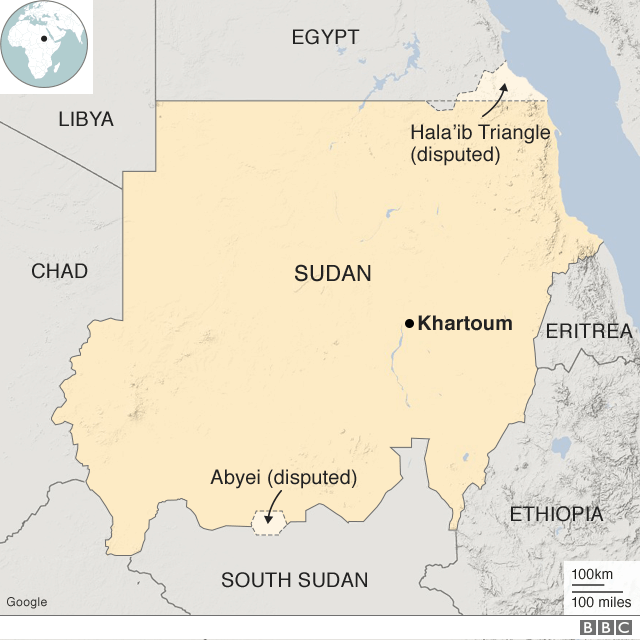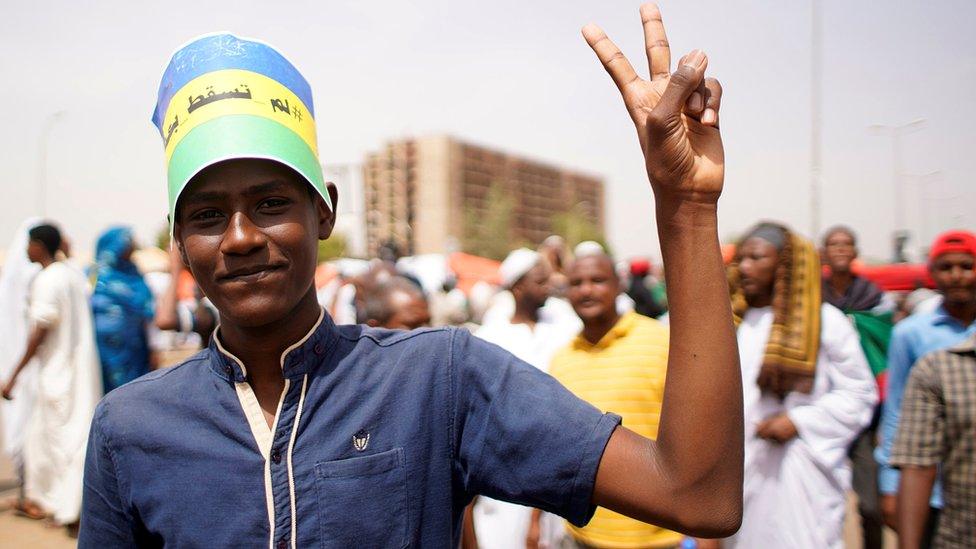Sudan coup: Military warns against disturbances
- Published
Sudanese women reject 'regime coup'
Sudan's military coup leaders have warned protesters still on the streets that there will be "zero tolerance" for disturbances.
A spokesman insisted the army did not seek power and Sudan's future would be decided by the protesters - but said the army would maintain public order.
Protesters are still out in Khartoum, fearing the coup leaders are too close to ousted ruler Omar al-Bashir.
The military says it will not extradite Mr Bashir on war crimes charges.
Mr Bashir is the subject of two international arrest warrants, external issued by the International Criminal Court (ICC). He is accused of organising war crimes and crimes against humanity in Sudan's Darfur region between 2003 and 2008, allegations he denies.
However, he may be put on trial inside Sudan, according to the military council set up after the coup.
Mr Bashir, one of the world's longest-serving leaders until he was ousted on Thursday, is now in custody.
His downfall followed months of unrest that began in December over rising prices. At least 38 people have died in the protests.
What are the military offering the protesters?
The army has said it will oversee a transitional period followed by elections. As part of this, it is imposing a three-month state of emergency, with the constitution suspended.
The military council will be in place for a maximum of two years, it says, but could last only a month if the transition to civilian rule is managed smoothly.
Lt-Gen Omar Zain al-Abidin, who heads the military council's political committee, said on Friday: "The solutions will be devised by those in protest.
"You, the people, will provide the solutions for all economic and political issues. We have come with no ideology, we have come here to maintain order and security to provide the opportunity for the people of Sudan to achieve the change they aspire to.
Allow X content?
This article contains content provided by X. We ask for your permission before anything is loaded, as they may be using cookies and other technologies. You may want to read X’s cookie policy, external and privacy policy, external before accepting. To view this content choose ‘accept and continue’.

"We have no ambition to hold the reins of power. We are here to provide an all-inclusive umbrella.
"Our key responsibility is to maintain public order," he added. "We will have zero tolerance for any misdeed in any corner of the country."
Later on Friday state media said the military had asked political parties to name representatives for a meeting with coup leaders at a later date.
Why are protesters so wary?
Thousands remained camped out near military headquarters in the capital on Friday, ignoring a curfew declared by the military.
They are demanding a transition to civilian rule before they return home.
The new military council is headed by Defence Minister Awad Ibn Auf, who was previously regarded as being well placed to succeed Mr Bashir.
Thursday's coup announcement was made by the defence minister Awad Ibn Auf
During the Darfur conflict, he was head of military intelligence. The US imposed sanctions on him in 2007, external in relation to his alleged support for militia blamed for atrocities in Darfur.
On Thursday Sara Abdeljalil, a member of the Sudanese Professionals' Association (SPA) which has spearheaded the protests, called the new military council a "continuation of the same regime".
"So what we need to do is to continue the fight and the peaceful resistance," she said.
Anti-Bashir protesters celebrate
Reacting to the military's statement on Friday, Khartoum resident Tagreed Abdin told the BBC: "We don't know who's behind the military council.
"We are used to hearing government double-speak but we need to see if they're really interested in dialogue and listening to the voices of the people."


A precarious moment full of possibility
The army said it had ruled out a violent response to the protests before Mr Bashir was overthrown because they didn't want the loss of life. It will be difficult (of course not impossible) to walk back on that.
There is then the question of the dynamics within the army. Younger officers and rank and file will have been emboldened by their role and public reception during the protests. Will they be content to allow the Mr Bashir generation monopolise military power?
And there's the economic crisis brought about by misrule, corruption and loss of oil revenues. Even the regime's friends in the Middle East and Asia will think twice about rescue packages if it looks like a new version of the old venality and brutality. That's an important pressure.
This is an exciting moment. Just think about the role of women in all of this, of social media and civil society. It's happening in Sudan but the significance of these forces working peaceful for change is universal. Yes it's very precarious, but also full of possibility.

What is the reaction abroad?
UN Secretary-General António Guterres appealed for "calm and utmost restraint by all" and urged a transition that would meet the "democratic aspirations" of the people. The UN Security Council is to discuss the situation in a closed-door meeting on Friday.
UK Foreign Secretary Jeremy Hunt said that a two-year military council was "not the answer", external and called for a "swift move to an inclusive, representative, civilian leadership".
Sudan protests: So what's going on?
The African Union condemned the military takeover, saying it was not an appropriate response to the challenges facing Sudan and the aspirations of its people.
Russia, which twice hosted Mr Bashir despite the international travel ban he faced, called for calm.


Have you been taking part in protests? You can share your experiences by emailing haveyoursay@bbc.co.uk, external
Please include a contact number if you are willing to speak to a BBC journalist. You can also contact us in the following ways:
WhatsApp: +44 7555 173285
Tweet: @BBC_HaveYourSay, external
Send pictures/video to yourpics@bbc.co.uk, external
Text an SMS or MMS to 61124 or +44 7624 800 100
Please read our terms & conditions and privacy policy
- Published15 April 2019
